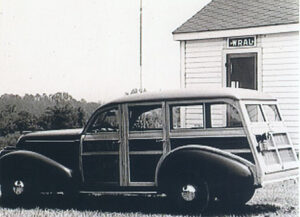
“Grass Roots” marketing must have originated at WRAL-AM. The station signed-on March 22, 1939, from studios at 130 South Salisbury Street in Raleigh. At that point in time, WRAL-AM was a 250 watt underdog to the 50,000 watt dominant WPTF radio station. It was going to be a tough row to hoe.
Fred Fletcher, CBC Vice President and son of CBC Founder A.J. Fletcher, and his merry men and women were always on the look-out for a way to make an impression in the community. By 1941, WRAL-AM secured its place in the market. How did they do it? One listener at a time.
In Fletcher’s book, “Tempus Fugit,” he described the “rather shameless self-promotion” used to draw attention. Enjoy these excerpts from his book.
Near the end of our 1941 brochure is a picture of the “WRAL Mobile Unit” that was, according to the copy writer, “kept ready at a moment’s notice so that listeners may be informed of emergencies in the vicinity.” The “mobile unit” is a late-30’s vintage, wooden-sided Pontiac station wagon. Although I don’t remember any emergencies that we rushed off to on a moment’s notice, I’m sure the station wagon went somewhere. And if there was an emergency, we were ready.
For a two year old station, we were making an impression. Then, and as we secured our place in the market, we engaged in rather shameless self-promotion – and some interesting promotions for our sponsors.
 WRAL-AM Woody News Wagon (1941)
WRAL-AM Woody News Wagon (1941)
For instance, several of us carried nickels in our pockets to put in the parking meter when we walked by a car whose meter was about to expire. We would put a nickel in the meter and a card on the windshield telling the owner how happy we were to have prevented his getting a parking ticket. I never was sure, however, that you could buy listeners for a nickel a piece.
We also leapt to the motorist’s rescue on the infrequent occasions when it snowed. We hired service station jeeps by the hour to pull cars back on the road and after the rescue the service station driver gave the motorist a card telling them that all of this was courtesy of WRAL.
There is one more promotion that sticks in my mind, although the reasoning that led up to it escapes me. We made the area’s first newscast from a fishing boat. We broadcasted from Captain Eddie Hanneman’s boat out of Wrightsville, and I suppose we talked about fishing conditions. There were several of us from WRAL plus our guest, Bill Ragsdale of Atlantic Richfield.
We liked that one so much that in the late ‘50s we did another one and wound up with the first blue marlin of the season. It was a 365 pound monster, and my scrapbook has pictures of Ray Reeve, Jimmy Chambers, Tom Gaddy and me with the fish on the boat, on the dock, and finally, in the Cameron Village Colonial store. We took the marlin back to Raleigh with us, and he even showed up on the 11 o’clock news.
Raleigh’s most famous marlin. (L-R) Captain Fulcher, Ray Reeve, Jimmy Chambers, Fred Fletcher, and Tom Gaddy. The man in front is one of Captain Fulcher’s crew.
“We got a lot of mileage out of this fish.” (L-R) Fred Fletcher, Governor Luther Hodges, Ray Reeve with the marlin at Cameron Village Colonial Store.
Fred Fletcher’s book “Tempus Fugit” has many delightful and down-right funny stories in it. You’ve just read a small sampling of anecdotes that demonstrate the lengths WRAL, radio and television, went to in the early years to make a personal connection with its audience. That relational philosophy continues today through a great wealth of community projects, news coverage, public relations, and members of the news staff appearing at special events, etc. It is a part of the DNA strand that forms CBC’s commitment to the community.
Thanks to Corp’s Pam Allen for this capcom story. Pam Parris Allen is a former WRAL newscast producer/director who now works as a researcher and producer on the CBC History Project.